Schools Today
The modern school as we know it was designed to provide workers for the expanding paradigm of the Industrial Revolution. That is, the first Industrial Revolution. We are now up to the Fourth Industrial Revolution, also known as Industry 4.0. So how well are we doing three Industrial Revolutions later?
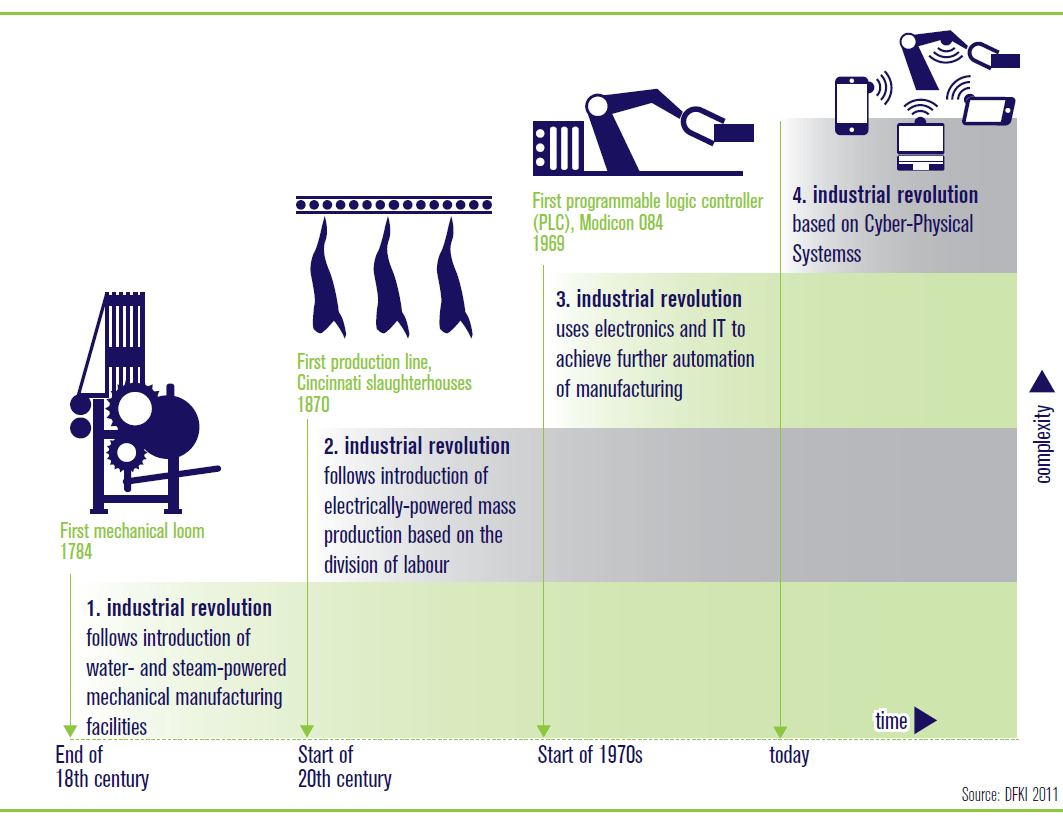
Industry 4.0
First of all, let’s look at the positives. Basic education has been an overwhelming success. A foundation level of literacy, numeracy and essential mathematics skills has served us really well for several generations. And it will continue to though the need for it is reducing because so much of our modern world does a lot of this for us. This is of course the developed world. We still have a third of the planet living in abject poverty and that is a challenge in itself. But the baseline education we all get at primary school works for the vast majority of people. I know there are exceptions who have both physical and intellectual challenges but it works on the whole.
So where is the issue?
Applied Learning
The real issue is when we start to get past basic education, the foundation we all benefit from, and start to move into Applied Learning or Interest Based Learning. Someone who is going to be a brilliant dancer might not benefit so much for advanced mathematics training. So we already allow for this in course selection. By VCE and the like there is a lot of selection going on. The same at University.
The issue comes back to what we are preparing students for. Funding policy drives a lot of decisions. You can’t keep a school open if the subjects you teach or how you teach them are not aligned with the funding model. You may not even get a sick bed or enough toilets (yes I know of one example of this)! And at present. we don’t seem to have governments with a strong view to to doing anything in schools except exclude faith and culture based learning and enforce the idea that alternative sexual orientations are preferred. At least this is how it looks to the community. And all this means we are not equipping students for the Jobs of the Future or the Industries of Tomorrow (or even today in many cases).
I present to Secondary Schools and Universities including MBA programs and recently to a Primary School. Schools matter. So it is time to start fixing a broken system. And it isn’t teachers and principals I am talking about here, it is funding policy.
Universities are funded based on peer reviewed papers and student numbers by class type. There is no requirement for either to be industry relevant. This has been the case for a while and we now find ourselves where this funding policy leads:
- Australia has the lowest rate of publicly funded research commercialisation in the world
- Australia has the lowest rate of academia to Industry engagement in the world
Put differently, the currently funding put into public research and academia structures is failing completely. The model is broken. And I’ve heard this repeatedly for the past half a decade so it isn’t just me.
Some other indicators that this is the case.
According to figures published by CEDA, The Committee for Economic Development of Australia, 40% of currents jobs will disappear in a decade.
Digital Readiness
Yet Digital Literacy in Australia continues to decline as the rest of the world gets ready for the next round of jobs and value creation while we fall behind. Everyone agrees that this is the wave of the future. But no action. The last policy discussion was in 2008!
Some references:
The latter had this graph of our current ranking in Digital Competitiveness (we used to be known as the country of early adopters).
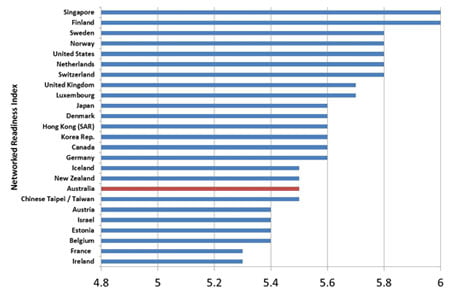
Australian Digital Competitiveness
I hope you notice that the most competitive economies in the world are also the most digital ready! Check out the Global Competitiveness Report summarised on Wikipedia to see the relativities. This is also why the current destruction of the capability of the NBN, or National Broadband Network, looks like economic sabotage when you consider how it is going to limit jobs growth potential and further stifle Digital Readiness.
It isn’t like this problem is new or not understood. It seems the current policy split is between:
- if it costs money you can’t have it because we can’t afford it
- protecting the borders is more important than ensuring there is something worth protecting inside them
- let’s redesign our social fabric because we can
Yes I know I have shown them in extreme profile, but this is where these ideas ultimately end up. And none of them are in the interest of Australia’s long term future. I don’t think being Digital Ready for the Future is restricted to a single gender, ethnic group or demographic nor mandated or precluded by your faith background or sexual orientation or any of a large number of other factors.
“Tomorrow’s jobs will be created by the workers, not companies“. Ray Keefe 2016.
You will see a similar quote below for primary schools. But this is the new paradigm. It is already here. This isn’t tomorrow. This is now. What is a Lean Digital Startup? It is creating your own job!
So this has been a long post already but there is one more element I want to share. And this is an initiative which I am hoping will be able to make a difference.
Tech Schools
No this is not a nostalgic return to the past, just using the same name for a very new approach.
I am pleased to announce that the Casey Tech School Strategic Charter was signed last week. I am one of two Industry Representatives involved in the process. Hopefully this will grow significantly once the foundations have been firmly established. And this same process is happening in other regions of Victoria.
So if they are reusing the name, what are they now using it for?
The Casey Tech School will use funding from the Victorian State Government to establish an advanced learning centre to augment existing schools. This will include Digital Ready learning opportunities and will support student interest learning and not just a fixed curriculum. The details of how to get this high leverage education facility interfaced with existing school activities is still to be worked out. But the core idea is that if there isn’t enough money for every school to do this independently, then spend one lot of money and let every school take advantage of it.
Here are a couple of photos of the event.

Casey Tech School Charter Signed
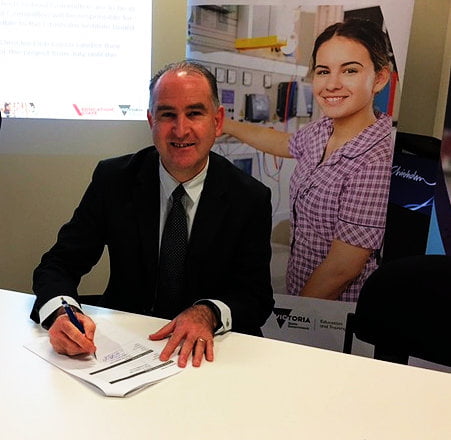
Successful Endeavours Support the Casey Tech School
And this isn’t the only interesting school initiative going on right now.
Primary Schools Step Up
As an example of where primary school teaching is going, I was recently involved in a Mini-Mart run by Dandenong Primary School. The Grade 5 students did a survey of the grade 3 and 4 students to determine goods they could design, build and sell to them. There were rules covering design elements, what constituted a sufficient offering and even things like Warranty. Then they made the goods, set up stalls, and in a series of waves tried selling to the same grade 3 and 4 students they had surveyed.
Brilliant.
And in between waves, they got advice on OH&S, selling and influencing techniques from a teacher who could have been presenting to an MBA program. I had to wait another 40 years after my Primary School experience before I got training in business skills as good as this. Needless to say, I was very impressed and it made me wonder why we aren’t doing this across the board.
| Mini-market moguls
Dandenong Primary School’s Grade 5 and 6 students have explored the process of creating, producing and marketing their own products.
The students hosted a mini-market as part of their school studies, surveying students from Grade 3 and 4 to see what products would sell and then competing to see who could sell the most.
“These children are going to have to invent their own jobs…”
The result was an impressive array of fun and appealing items from bookmarks and fridge magnets to squishy balls and multi coloured slime.
The event was supported by four local employers who judged each team on their product design and quality, stall design and customer service.
Ray Keefe from Successful Endeavours was joined by Anthony Di Battista from Hilton Manufacturing, Marcus Barber from Looking Up Feeling Good and Chelsie Dickson from Cirque Design.
“These children are going to have to invent their own jobs so it’s great they’re thinking about this very important challenge now,” Mr Keefe said.
Dandenong Primary School looks set to produce some impressive entrepreneurs of the future if the success of this project is anything to go by.
from Community News – The City – November 2016 |
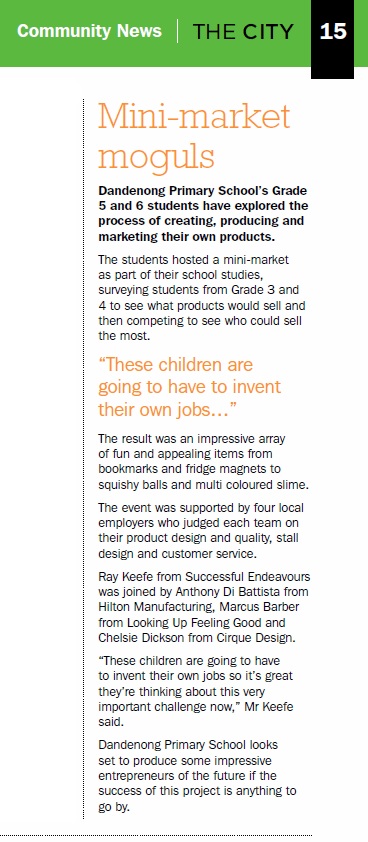
|
Jobs of the Future
And if you want a really interesting view of what this could be like 10 years from now, I recommend readings Rainbow’s End by Vernor Vinge. Enjoy. It’s not just the education component, it’s the whole idea that jobs just wont exist any more!
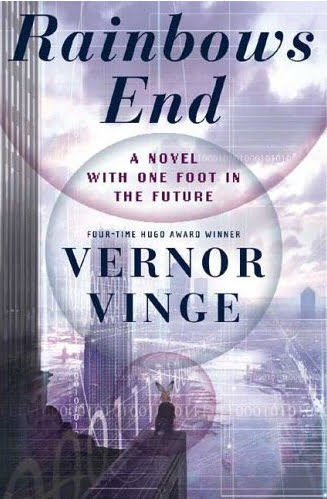
Rainbows End – Vernor Vinge
Rainbow End : Fair use
Successful Endeavours specialise in Electronics Design and Embedded Software Development, focusing on products that are intended to be Made In Australia. Ray Keefe has developed market leading electronics products in Australia for more than 30 years. This post is Copyright © 2016 Successful Endeavours Pty Ltd.









